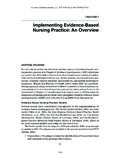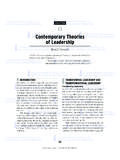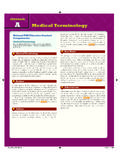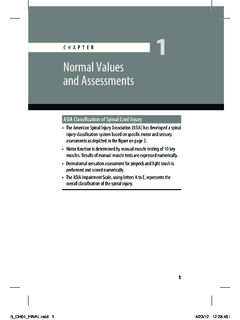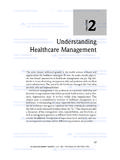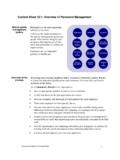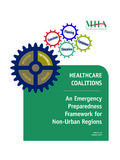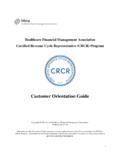Transcription of An Overview of Healthcare Management
1 Jones & Bartlett Learning, LLC. NOT FOR SALE OR DISTRIBUTION. 1. Chapter An Overview of Healthcare Management Jon M. Thompson, Sharon B. Buchbinder, and Nancy H. Shanks Le a r n i n g O b je cti ve s By the end of this chapter, the student will be able to: Define Healthcare Management and the role of the Healthcare manager;. Differentiate between the functions, roles, and responsibilities of Healthcare managers; and Compare and contrast the key competencies of Healthcare managers. Introduction Any introductory text in Healthcare Management must clearly define the profession of Healthcare Management and discuss the major functions, roles, responsibilities, and com- petencies for Healthcare managers.
2 These topics are the focus of this chapter. Healthcare Management is a growing profession with increasing opportunities in both direct care and non direct care settings. As defined by Buchbinder and Thompson (2010, pp. 33 34), direct care settings are those organizations that provide care directly to a patient, resi- dent or client who seeks services from the organization. Non direct care settings are not directly involved in providing care to persons needing health services, but rather support the care of individuals through products and services made available to direct care settings. 1. Jones & Bartlett Learning, LLC. NOT FOR SALE OR DISTRIBUTION. 2 Chapter 1 A n O verview of H ealthcare M anagement The Bureau of Labor Statistics (BLS) indicates that Healthcare Management is one of the fastest growing occupations, due to the expansion and diversification of the Healthcare industry (Bureau of Labor Statistics, 2010).
3 The BLS projects that employment of medical and health services managers is expected to grow 16% from 2008 to 2018, faster than the average for all occupations. These managers are expected to be needed in inpatient and outpatient care facilities, with the greatest growth in managerial positions occurring in outpatient centers, clinics, and physician practices. Hospitals, too, will experience a large number of managerial jobs because of the hospital sector's large size. Moreover, these estimates do not reflect the significant growth in managerial positions in non direct care settings, such as consulting firms, pharmaceutical companies, associations, and medical equipment companies.
4 These non direct care settings provide significant assistance to direct care organizations, and since the number of direct care managerial positions is expected to increase significantly, it is expected that growth will also occur in managerial positions in non direct care settings. Healthcare Management is the profession that provides leadership and direction to organizations that deliver personal health services, and to divisions, departments, units, or services within those organizations. Healthcare Management provides significant rewards and personal satisfaction for those who want to make a difference in the lives of others. This chapter gives a comprehensive Overview of Healthcare Management as a profession.
5 Understanding the roles, responsibilities, and functions carried out by Healthcare manag- ers is important for those individuals considering the field to make informed decisions about the fit. This chapter provides a discussion of key Management roles, responsibili- ties, and functions, as well as Management positions at different levels within Healthcare organizations. In addition, descriptions of supervisory level, mid-level, and senior manage- ment positions within different organizations are provided. The Need for Managers and Their Perspectives Healthcare organizations are complex and dynamic. The nature of organizations requires that managers provide leadership, as well as the supervision and coordination of employees.
6 Organizations were created to achieve goals that were beyond the capacity of any single individual. In Healthcare organizations, the scope and complexity of tasks carried out in provision of services are so great that individual staff operating on their own couldn't get the job done. Moreover, the necessary tasks in producing services in Healthcare organizations require the coordination of many highly specialized disciplines that must work together seamlessly. Managers are needed to make certain that organizational tasks are carried out Jones & Bartlett Learning, LLC. NOT FOR SALE OR DISTRIBUTION. T h e N e e d for Managers and Their Perspectives 3. in the best way possible to achieve organizational goals and that appropriate resources, including financial and human resources, are adequate to support the organization.
7 Healthcare managers are appointed to positions of authority, where they shape the orga- nization by making important decisions. Such decisions relate, for example, to recruitment and development of staff, acquisition of technology, service additions and reductions, and allocation and spending of financial resources. Decisions made by Healthcare managers not only focus on ensuring that the patient receives the most appropriate, timely, and effective services possible, but also address achievement of performance targets that are desired by the manager. Ultimately, decisions made by an individual manager affect the organiza- tion's overall performance. Managers must consider two domains as they carry out various tasks and make decisions (Thompson, 2007).
8 These domains are termed external and internal domains (see Table 1-1). The external domain refers to the influences, resources, and activities that exist out- side the boundary of the organization but that significantly affect the organization. These factors include community needs, population characteristics, and reimbursement from commercial insurers, as well as government plans such as the Children's Health Insurance Plans (CHIP), Medicare, and Medicaid. The internal domain refers to those areas of focus that managers need to address on a daily basis, such as ensuring the appropriate number and types of staff, financial performance, and quality of care. These internal areas reflect the operation of the organization where the manager has the most control.
9 Keeping the dual perspective requires significant balance on the part of Management and significant effort in order to make good decisions. Table 1-1 Domains of Health Services Administration External Internal Community demographics/need Staffing Licensure Budgeting Accreditation Quality services Regulations Patient satisfaction Stakeholder demands Physician relations Competitors Financial performance Medicare and Medicaid Technology acquisition Managed care organizations/insurers New service development Source: Thompson, 2007. Jones & Bartlett Learning, LLC. NOT FOR SALE OR DISTRIBUTION. 4 Chapter 1 A n O verview of H ealthcare M anagement Management : Definition, Functions, and Competencies As discussed earlier, Management is needed to support and coordinate the services that are provided within Healthcare organizations.
10 Management has been defined as the process, comprised of social and technical functions and activities, occurring within organizations for the purpose of accomplishing predetermined objectives through humans and other resources (Longest, Rakich, & Darr, 2000). Implicit in the definition is that managers work through and with other people, carrying out technical and interpersonal activities, in order to achieve desired objectives of the organization. Others have stated that a manager is anyone in the organization who supports and is responsible for the work performance of one or more other persons (Lombardi & Schermerhorn, 2007). While most beginning students of Healthcare Management tend to focus on the role of the senior manager or lead administrator of an organization, it should be realized that Management occurs through many others who may not have manager in their posi- tion title.

